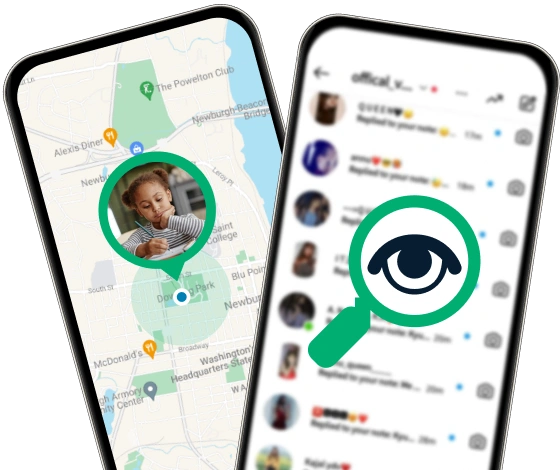Catfishing is when a person pretends to be someone else, usually on a fake social media account. Someone who is catfishing usually targets a specific person, and the person who does it can have many motivations. They might do this for personal gain, revenge, or simply for the thrill of deception. It can also be used to manipulate emotions or financial situations.
The worst thing here is that it causes psychological wounds to their victims, and, according to the 2024 report, 35% of people who faced catfishing online experienced depression and anxiety, 20% could not trust other people again, and 12-15% experienced PTSD symptoms for weeks.
At uMobix, we regularly analyze all the types of online dangers, like catfishing scams, cyberbullying, blackmailing, sadfishing, and social media scams, to list a few. We aim to help everyone protect themselves and their loved ones from online threats.
This review will tell you all you need to know about catfishing and how to recognize and safeguard against this deceptive practice.
What Is Catfishing?
Before we start, we’d like to tell you more about catfishing. So, what is catfishing on the Internet? Catfishing means malicious actions performed by a person who purposely steals another person’s photos, name, surname, and other details to create a fake identity online to trick, harass, or scam another person. It often happens on social media or dating apps. People use it to start fake online relationships, sometimes to trick others into financial scams.
Why Is It Called Catfishing?
While creating a false identity online has been around since the Internet, the term catfishing was popularized in 2010 due to the documentary Catfish, in which a young executive producer, Nev Schulman, starts an online relationship with 18-years teenager “Megan”, who turns out to be a 40-year-old woman. You may probably ask: “Why is it called catfishing?” Here is the answer: in the documentary, the woman’s husband likens her behavior to that of a catfish being shipped with live cod.
Is Catfishing Illegal?
Catfishing itself is not inherently illegal. However, many fail to realize that catfishing someone has a way of being right on the border of illegality. For instance:
- Using someone else’s photo is considered illegal (infringing on intellectual property).
- Impersonating someone can damage their reputation.
- Sexual acts with a minor are considered to be illegal and are a serious crime.
- Asking for money or goods under pretenses is illegal.
Simply chatting as someone else isn’t illegal, but using someone’s photo to create a fake persona is. More serious crimes involve tricking people into giving money or gifts. In these cases, legal action can be taken against the catfisher.
5 Reasons People Catfish

So, why do people catfish? There are many reasons why people choose to catfish online. They include but are not limited to the following:
- Craving for admiration: Catfishing happens when people are dissatisfied with who they are in real life. For this reason, they create a personality online that conforms more closely to the one they wish they were. They can steal photos of the other person, their achievements, career success, etc., to seem more appealing to the other users so that they admire their “success.” Their goal is to gain admiration from others online, even if it has nothing to do with their real life. They crave attention and validation, which they can’t get in reality, so they seek it in the digital world.
- Conceal their true identity: People may decide to create fake identities to be able to share their ideas more openly without worrying about possible consequences it may lead to. Many users start catfishing to make new acquaintances online and extort money from the person they chat with. It is a very convenient way of deceiving others without exposing their true identity, allowing them to manipulate situations while staying anonymous (no authorities will be able to prove that as their identities are unrealistic ones).
- Revenge: Some users go for catfishing online because of the strong desire for revenge. They feed strong dislike towards someone and decide to use their offender’s name, surname, personal details, and even a photo for catfishing. Then, they start doing various cruel things that make the person look bad, from spoiling relationships with their friends to getting involved in illegal activities under the target’s name.
- Loneliness and psychological disorders: The other reason explaining the frequency of catfishing scams is psychological problems. People want to be admired and need attention from others, but when they lack it (though this does not refer to everyone), they may start thinking about catfishing. They believe creating a fake identity will give them more validation than they receive in real life. They think it will help them feel more confident and allow them to lead what they see as a “normal” life online.
- Experiment with sexual identities: Some catfishers use catfishing to explore their sexual identity. They create a fake profile with the sexual preference they are curious about. By interacting with others under this fake identity, they get to see what it might feel like to live that way in real life.
Lack of self-confidence is the main reason why many people start catfishing. When they feel unhappy with themselves or think their real identity isn’t good enough, they create a fake identity to feel better or achieve something they want. With a false identity, catfishers feel free and can be who they want to be.
What Happens During Catfishing?
While each catfish story is different, it does follow a similar formula. Here are the common steps:
- The catfish scammer creates a fake persona, usually via a catfish account. This account may use another person’s photos and claim they belong to the catfisher.
- Because other photos are easily traceable, many catfishers turn to AI-generated images or pictures of them using a filter.
- The catfisher begins a relationship with another person.
- This fake relationship tends to have an end goal. For example, the catfisher may convince the person to give them money or personal details such as nude photos.
How Spot Catfishing Scams?
Once we have already told you about catfishing scams, it would be useful for you to know how to detect them – and that is what we will tell you in the next section of this review.
Signs of a Catfish: How to Catch a Catfish Online?
Here are the most common signs of a catfish you have to look for:
- Fake Profile Pictures of Photos Look Too Professional
A catfisher tends to use fake profile pictures. If they’re AI-generated, perhaps you notice something odd with the face structure or the hands. Also, the photos tend not to be selfies or amateur photos but professional headshots.
Of course, there are exceptions to this rule, and some catfishers use a variety of photos. You can reverse image search the picture if you’re not sure. However, image search sometimes does not work, so beware.
- Sparse Social Media Account
Not everyone updates their Facebook, but a catfisher’s account will not have many details beyond their fake photos or them promoting a suspicious link. It could be a sign of a catfisher unless they’re just starting the account and are still adding new things to it.
- Avoidance of Video Chat
A catfisher will come up with many excuses as to why they can only DM you, such as their broken camera, anxiety, etc. Of course, the real reason is that they look like nothing they claim. Some who can put on a good voice may call you to add more authenticity than just text messaging, so beware.
- The Relationship Is Going Too Fast
Some people live on the fast line but take a step back if you notice how quickly your relationship goes from talking to flirting to asking for nudes. It doesn’t necessarily mean the person is a catfisher, but you should ask them if they can take things slower. If they don’t listen, this is a major red flag.
- They Are Too Perfect
If it’s too good to be true, it probably is. It applies to catfishing as well. Be skeptical, especially if they’re asking for favors from you. Also, some catfishers may be people who know your interests and have created the perfect profile that checks all your boxes.
- Little Friends or Followers
A catfisher tends only to have a few friends or followers on social media, and it’s usually the people they are trying to victimize. In addition, you probably have no mutual friends with them, so keep that in mind.
- Sob Stories with Requests for Money
Catfishers tend to prey on people’s goodwill. For example, the catfisher may claim they’re about to be evicted and have no money to pay rent or claim they have medical bills. Many can weave a good story, even supplying photos of fake bills as evidence. We understand wanting to help out people, but if the account seems fake, don’t feel bad not giving them money.
Websites and Apps Used by Catfish Scammers
- Open chat apps: Some apps bring back the old-school chatroom, where many people claim they’re someone they’re not. If you’re chatting with someone, being skeptical is always intelligent, especially when using a chat app or any other social media catfish targets.
- Instagram: Instagram is a social media catfish haven with its many filters and model culture. People will pretend to be models, even uploading photos. If you’re speaking to a hot Instagram model, ensure it’s not a catfish.
- Tinder: Tinder is an app that many people use to get into a relationship. Some Tinder users are desperate, so if someone flirts with them, they may let their guard down. If the date suddenly asks for travel money, beware.
- Facebook: Facebook is a website that prides itself on people using their real names. However, it’s easy for someone to create a fake account. Also, Facebook is home to many women over 40, who are the most likely to be catfishing victims. One way to avoid this is to adjust your privacy settings so that only people with mutual friends can add you.
Am I Being Catfished? What to Do If You or Your Kids Are Being Catfished?

If you suspect you are being catfished or your kid has become a victim of catfish scams, you will need to know what steps should be taken to act wisely.
Ask for help: If you suspect you’ve been catfished, feeling scared or embarrassed is normal. Remember, this can happen to anyone, and it’s not your fault. So, ask for help from someone you can trust (a friend, family member, colleague, etc). You can also turn to a counselor if the situation causes emotional distress.
Check identity: Save the person’s phone and download it using Google Images. Analyze whether it appears elsewhere and whether there is no other account with the same photo but the other name on the Internet.
Ask for a video call: If you or your kid have been chatting with someone for a long on the internet but still have not met each other offline, ask for a video call. If they refuse, it may be a first warning sign they are hiding something and do not want to show their real identity.
Report suspicious users: Notice a suspicious personality communicating with you or your kid on social media? Report them to the platform they are using. If you or your children are being threatened or financially exploited, contact your local authorities.
How Are Kids Especially Vulnerable to Catfishing?
If you want to keep kids safe online, you need to beware of catfishing on social media.
During childhood and adolescence, a person is more susceptible to manipulation, especially from someone who appears to be their own age. A catfish scammer takes advantage of this fact by creating catfish teens.
Another reason teenagers can be vulnerable is because of how emotional this life period is. If a teen just broke up with someone, fell out with their friends, or is in another challenging situation, they may seek refuge in online spaces. There, they can run into a catfisher.
Anyone can be a catfisher. But, according to Marketing Scoop statistics, over 64% of identified catfishers are women. Around 43% of catfishing scams target CEOs, founders, or self-employed individuals, assuming they have extra money and high empathy. Necessary to note taht over 80% of these scams begin on Facebook, taking advantage of its large user base and weak identity checks before moving to direct messaging.
How to Protect Your Kids from Being Catfished
If you have children, you may worry about them becoming catfishing victims. Here are some ways you can fight back.
Talk to Them About Online Strangers
Sometimes, all you need is to talk. Here are the main topics you have to discuss with your kid:
- Say to your kids that many people online aren’t what they seem. Tell them how catfishing works and how they can avoid it.
- Explain that while making friends online is normal and can be good, your child should be skeptical of who they are talking to and never give any personal information or do anything that makes them uncomfortable.
- Tell them that they should never engage in conversations or activities that make them feel uncomfortable. If they notice something suspicious, they must immediately tell you about it.
- Inform your kid about the red flags they must pay attention to when communicating online: requests for money, overly personal questions, or pressure to meet in person.
- Let them know it’s okay to stop talking to someone if they feel uneasy. They are not obliged to communicate with those who cause stress and anxiety.
Install a Parental Control App uMobix to Monitor Their Online Activity
Another way parents can fight back against catfishing on social media is through parental control apps. Most devices have built-in parental controls to restrict particular apps and block websites. Besides that, parents can also use spy apps to see what their kids are up to. One of the best and most reliable solutions is uMobix.

So, what can you get when using uMobix? Once you install the app on your kid’s iOS or Android-operated phone or tablet, you will be able to:
- Monitor their social media profiles.
- Get full access to their Instagram and Facebook accounts and be able to manage them as if you were their owner (respond to comments, DMs, stories, view news feed, etc).
- Get a professional, 24/7 customer assistance.
This app can send real-time screenshots and data from your child’s conversations. If you suspect your child is talking to someone who’s not who they seem, uMobix can be a valuable tool for keeping your children safe.
Along with the cool features listed, this app offers a range of essential parental controls, including GPS location tracking, keylogging, browser history checking, audio and video streaming, call logs, SMS/MMS viewing, and much more. The best part? You can dive in with a trial version for just $1, giving you full access to all the features for two days. It’s the perfect way to explore everything the app has to offer and see how it can benefit you!
Final Words About Catfishing
It’s common knowledge that people lie on the Internet. However, catfishing is a bigger problem than ever before. If a person is giving off red flags, you should avoid them, as they may be trying to scam you. In addition, you should keep yourself, your kids, your dearest, and your nearest safe when navigating online to protect them from the potential dangers of catfishing.
We hope this post was informative and will help you and your family stay safe online. While you don’t need to constantly monitor your child’s online activities, staying informed and aware of potential dangers can help you prevent risks. Modern technology, like uMobix, makes it easier to stay connected and vigilant. With its comprehensive monitoring features, uMobix will let you protect your loved ones from online threats while they surf on social media.
FAQ
Pretending to be someone else on the Internet is not a crime. However, the activities of catfishers can be illegal. For example, asking a minor for nudes and receiving them is definitely a crime. In some cases, scamming a person or cyberbullying them can be illegal. It also depends on the laws in your area.
Most catfish profiles will need more information, use overly professional photos or look fake. In addition, if the person seems too good to be true, they may be a catfisher. Sometimes, a catfisher can avoid most red flags; your best bet is to trust your gut.
First, you should have a talk with your child about catfishing. Explain how many are falling victim to it and how the child should not give away any personal information. If you're that suspecting your child is a victim of catfishing on social media, install uMobix and react promptly.

Latest posts
- 10 Best Apps for Parents to Monitor Social Media: 2026 Guide
- Complete List of Keywords to Block for Parental Control
- Does Telegram Notify Screenshots? Everything About Screenshot Detection
- How to Find Someone’s Deleted Instagram Posts: Complete Guide
- Family Tracking App by uMobix: Keep Loved Ones Safe




